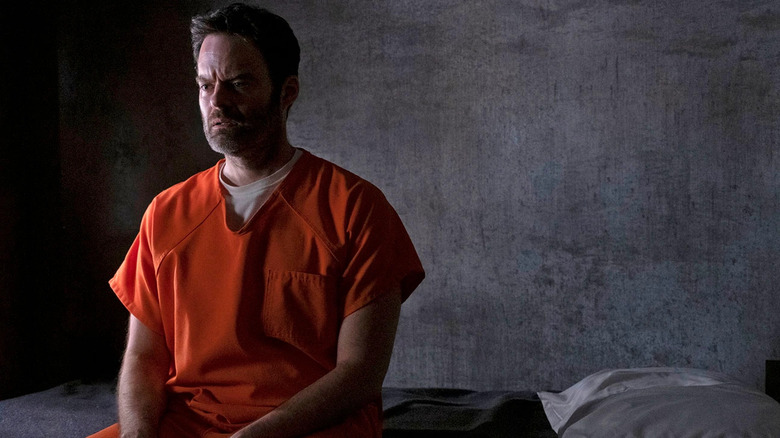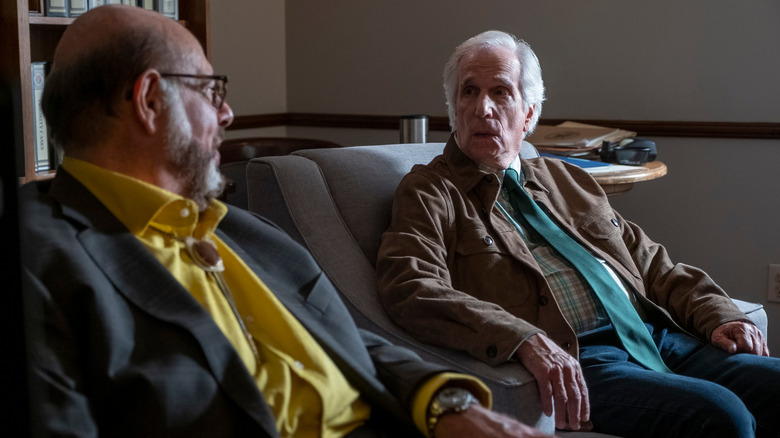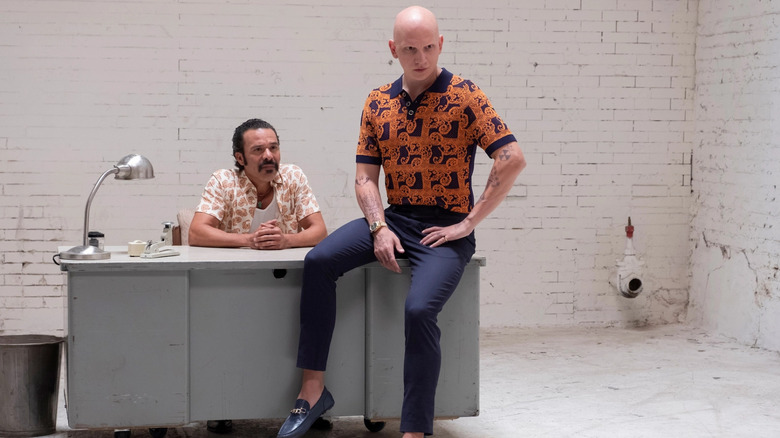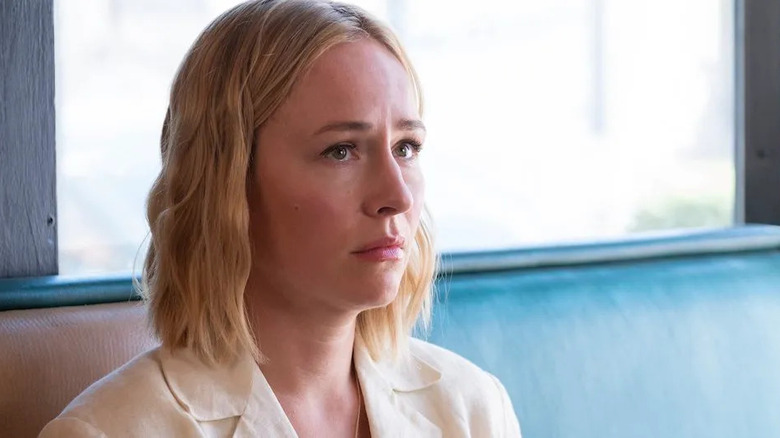Barry Is Not A Show About Hitmen Or Acting — It's About Toxic Relationships
This article contains massive spoilers for the latest episode of "Barry."
When Bill Hader and Alec Berg's HBO series "Barry" was first announced back in 2018, the show's identity was pitched somewhere between dark comedy and dramedy. Speaking to Vulture on the eve of the first season's release, Hader explained how he and Berg landed on placing their hitman protagonist inside a Los Angeles acting class because "we were struck by how much it felt like group therapy. We decided, 'Okay, Barry can realize things about himself through theater.'"
That's a more insightful observation than the average layman might realize — for anyone who's taken an acting class a little more advanced than high school level (or potentially even at that level, if the instructor happened to be ambitious), these classes often resemble a bizarre sort of group therapy session more than anything else. Where one might expect to see discussions of scenes, characters, and craft, such classes have an unsettling tendency to devolve into a form of intensely personal therapy that's also weirdly competitive, as if whoever breaks down first and hardest wins the day (as a longtime theatre major during my youth, I do sadly speak from experience).
In other words, these classes can become toxic in a way that's so insidious and so fast that it's happened before you know it. That's what's happened to Hader's Barry Berkman and "Barry" itself, as it continues its fourth and final season. Sure, there was always going to be a rotten core inside the world of murder and crime, but what "Barry" has done through each season, culminating in this one, is portray the toxicity of all sorts of relationships, especially those within the entertainment industry and — the granddaddy of all toxic relationships — family.
Hi, I'm the problem, it's me
It's weird to call toxic relationships the main theme of "Barry" now that it's become so abundantly clear, but when looking back at the series as a whole, one can see what a clever sleight-of-hand Berg and Hader have played on their characters and the audience. When "Barry" began, it seemed to be the story of a tiger looking to change his stripes.
After Berkman made the fateful choice to follow the target that brought him to Los Angeles into the acting class of Gene Cousineau (Henry Winkler), he not only found himself bitten by the acting bug and smitten with both Gene and fellow student Sally Reed (Sarah Goldberg) but decided then and there to make a full-on life change. After all, that initial target, Richard Krempf neé Ryan Madison (Tyler Jacob Moore), ended up being killed by Chechen hitmen, a circumstance that allows Barry and "Barry" to establish a narrative that he's utilizing acting and his burgeoning relationships with Gene and Sally to move away from his dark, deadly past.
Although the first few seasons of "Barry" seem to be a classic tragic tale about how one can never truly escape their past, Berg and Hader slyly smuggle the real, deeper themes of the series underneath that. Despite Barry's handler-cum-surrogate father, Monroe Fuches (Stephen Root), refusing to let him go, it's really Barry's own twisted soul that will never allow him to escape into an idealized bliss, domestic or otherwise. There's a pointed significance to Barry's choice of stage name, "Barry Block," the name signifying the killer's futile desire to block out his true self.
All in the family
Of course, some toxic relationships are a two-way street, with two or more people involved in perpetuating vicious cycles of rancid behavior. Barry is enabled not just by Fuches but by his friendship with NoHo Hank (Anthony Carrigan), who acts as a sort of surrogate little brother to Barry, always looking up to him with starry-eyed admiration. Barry's view of himself as an innocent man with a heart of gold trying to do the right thing ends up doing the most harm to those around him, arguably more than any deadly actions he takes.
Yet, as the current season seems to be demonstrating, this behavior was ingrained in Barry from a young age. His highly toxic relationship with Fuches alternates between mentor/mentee, partners-turned-rivals, and father figure, and on top of all that, it turns out Fuches may have been introduced to Barry by Barry's biological father when he was just a boy. Barry's choice of potential replacement father figure, Gene, is already a deeply flawed person before the hitman ever meets him, having alienated a large number of his peers and, most importantly, his own family, including a son, Leo (Andrew Leeds), who he's very estranged from.
It'd be easy to view Sally, Barry's girlfriend, as an innocent victim in their romantic relationship, yet she's just as messed up in her own way. That's thanks in large part to her prior relationship with her abusive ex-husband, but as this season shows, Sally's own parents (Romy Rosemont and Michael Dempsey) treat her with a remarkable amount of belittling and dismissiveness. As with most studies of toxic individuals and the relationships they form, it becomes clear that many of them were set up to fail.
Starting the process anew
The real proof of a toxic relationship lies in a person's perpetuating toxic behavior — we all have checkered pasts, but if we're an active part of taking our past pain and recycling it anew unto others, that's when toxicity is undeniably present.
As seen in the latest episode of this season, the seemingly once-innocent Hank not only emotionally "breaks up" with Barry, he seriously jeopardizes and ultimately betrays his relatively healthy relationship with Cristobal (Michael Irby). Granted, the two being raised in different crime families is also heavily to blame, as they cannot help but upend their reward of peaceful bliss by entering into a foolhardy scheme to import sand for profit. If Barry is Hank's spiritual inspiration, there's also the close-knit ties he has to his actual family within the Chechen mafia which prove too strong to resist, resulting in not just the dissolution of his relationship but the end of Cristobal's life.
Gene's most major toxic trait, his rampant ego, can hardly be contained as he gleefully attempts to lead a Vanity Fair reporter (Patrick Fischler) down a trail to his confessional one-man show, eventually blowing off all pretense of anonymity and reveling in his part in getting Barry arrested. This foolhardy choice not only leads to the reporter being permanently traumatized by Jim Moss (Robert Wisdom), the violent father of one of Barry's victims and Gene's ex-partner, but seemingly seriously injures (if not kills) Leo, as a paranoid Gene (believing an escaped Barry is hunting him) shoots his unsuspecting son, completing a vicious cycle of pain begun between the two long ago.
Can family be found — and should it?
Not even Sally is innocent, despite remaining in the relatively more cuddly world of showbiz, as she foists Gene's borderline abusive acting training onto a new group of students. Although she's rightfully chewed out by the students for that, she nonetheless is rewarded for it by getting the opportunity to become an acting coach to a statuesque beauty (Ellyn Jameson) hired for a cheesy sci-fi film directed by one of her personal heroes ("CODA" director Sian Heder).
After the humiliating whirlwind that was the ill-fated production of Sally's TV series during season 3, this new comeback trial Sally knows how to play the game, utilizing her position to showcase her natural acting talent to the director under the guise of helping the other actress. It's enough to draw some attention to her, as a fellow Hollywood hotshot lays out a job offer and plans for her to gain back her career as well as become obscenely rich.
The finale of the latest episode pulls yet another sleight-of-hand, revealing that Sally perhaps did leave with an escaped Barry to an undisclosed location and that some of the fantasy sequences of Sally and Barry together that we've been seeing peppered through the season may not have been fantasies but flash-forwards, as Sally and Barry are living together with a son (who unsurprisingly gets himself into fisticuffs with other children). Is this merely another fantasy, or is this the "Barry" way of demonstrating how the cycle of toxicity is doomed to continue, in family units either "found" or forged? One thing's for certain: despite the most desperate wishes of Barry at the beginning of the series, there will be no clean, fresh start for him or anyone in his orbit. All stories about hitmen tend to end in death; maybe Barry's fate isn't a quick bullet, but a slow bleed.




